UBC Personal Profile: Examples, Question Samples & Prep Tips 2023/2024
If you’re looking for UBC Personal Profile questions, examples, and prep tips, then you’ve come to the right place.
Before you dive in, it’s important to understand that UBC admissions committees receive thousands of applications every year. To help you stand out from the crowd , you need to demonstrate a clear sense of self , strong life experience , and exemplary communication skills .
Our ‘full student’ coaching process will help you improve in all these areas (and more!).
If you’re not working with a coach, be sure to read the Self-Awareness , Goal-Setting , and Narrative Communication & Deductive Communication Skills Guides. All of these resources will empower you with the skills you need to show the admissions committee who you are , what you want to accomplish , and why you’d be a great fit for the University of British Columbia .
COACH’S TIP: You’ll also notice that all our Personal Profile templates use the Narrative/Deductive Approach (DON’T FORGET to access your FREE blank template) so you can see an effective general structure for your essays. We’ll provide a breakdown and example for each UBC Personal Profile question below. You can choose EITHER the Narrative OR the Deductive approach for your UBC Personal Profile essays. The Narrative Approach is usually for Arts/Business programs , or for personal questions where you want to tell a memorable story that creates an emotional connection with the reader. The Deductive Approach is typically used for STEM programs , where you have to provide an argument in a logical and structured way.
DON’T feel like you have to stick to this model — it’s just a guideline so you can learn to communicate in a way that’s most familiar to you. Just choose the approach that you’re most comfortable with (and get in touch with us if you need some help deciding which is best for your application).
REMEMBER : This guide offers GENERAL guidance for the Personal Profile and is NOT PROGRAM SPECIFIC — some questions might be added, removed, or different depending on which program you’re applying to. Make sure you do you research and complete the ENTIRE application for your program.
If you’re serious about getting into your top-choice program at the University of British Columbia and reaching your fullest post-secondary potential, connect with a Youth Coach™ . It’s never too early to receive coaching.
Table of Contents
- UBC Personal Profile Overview : What is the Personal Profile?; Why do you need to write it?; How is it evaluated?; How to use this guide; and More.
- 2022/2023 UBC Personal Profile : Questions; Templates; Examples; Prep Tips; and More.

UBC Personal Profile Examples – Overview
In this section, we’ll go through all the must know information for your UBC Personal Profile.
What is the UBC Personal Profile?
The Personal Profile is mandatory for ALL high school students applying to any degree on UBC’s Okanagan or Vancouver campuses .
If you are applying to Bachelor of Design in Architecture, Landscape Architecture, and/or Urbanism, you do not need to submit a Profile.
The UBC Personal Profile is made up of up to 8 short written essays (depending on the program you’re applying to). Keep reading for a full list of the questions, as well as essay templates and examples for each question.
You can access and submit the Personal Profile on EducationPlannerBC .
COACH’S TIP : Write your essay responses BEFORE you start your online application, so that you have time to rewrite, edit, and polish your answers. When you sign in to EducationPlannerBC, you will have to upload your answers immediately, so if you have them saved in a separate doc, you can simply copy and paste them.
IMPORTANT: The application opens on EducationPlannerBC in early October 2022 and the deadline to submit your application (including the Personal Profile) is January 15, 2023 at 11:59pm PST for regular admission.
Why Do You Need to Submit the UBC Personal Profile?
The UBC Personal Profile allows the program(s) you’re applying to get a better sense of who you are beyond your grades .
Without it, you’re just a name on a page, and it’s really hard to differentiate you from other applicants, especially when everyone is a competitive applicant.
The UBC Personal Profile asks you to talk about things like your:
- Experiences
- Leadership Potential
- Achievements
- Challenges you’ve overcome
- Extracurriculars (across multiple years)
- …and all the valuable lessons you’ve learned along the way!
The evaluators use all these details to see if you’d be a good fit for the program you’re applying to and UBC more generally. They will also use this information to see if you will receive an entrance scholarship.
Put simply, they want to figure out what makes you, you , as well as the experiences and lessons that have helped in this process.
The Profile can also help make your application more competitive (especially if your average is a bit lower) because you can emphasize the fact that you’re a well-rounded student who has the drive, skills, and passion to succeed in the program .
Keep reading for explanations for each question, as well as templates and examples to help you write the best Personal Profile possible.
How is the UBC Personal Profile Evaluated?
The UBC Personal Profile is evaluated by readers who have been trained and are familiar with the area of study you’re applying to.
While there are no right or wrong answers , the Profile evaluators don’t want you to simply list a bunch of activities you’ve done and things you have accomplished.
Instead, they want to understand what you’ve learned from doing all these things and that you can articulate deep personal insight in all your answers. They also want you to use specific examples .
Strong essays will answer questions like these:
- What did this experience teach you about yourself?
- What did this experience teach you about others?
- How did this experience change your outlook of the world?
- How did it impact your goals and plans for the future?
- What skills did this experience help you improve?
- Did this experience start/intensify your passion in your chosen field?
- What did the challenges that arose during this experience teach you?
- How has this experience changed you as a person and as a leader?
UBC Personal Profile Evaluation Rubric
Reviewers evaluate each essay in your Personal Profile according to 4 criteria :
1. ENGGAGEMENT AND ACCOMPLISHMENT:
Using specific examples, your answers should outline the activities, initiatives, causes, accomplishments, etc. that you’re most proud of and care most about, and the accomplishments you’ve had in those areas.
You should detail what you’ve learned because of these experiences, and how they’ve made you a better person both inside and outside the classroom.
Here are some things to think about to help you get started:
- What you care most about
- The people who are most important in your life
- How you manage your time and responsibilities
- Hobbies, volunteer work, or other interests you’re passionate about
- Community involvement and specific accomplishments you’ve achieved
- A goal or project you’ve set for yourself and achieved (and how you’ve done that)
- How you develop your passions and interests in various areas of your life
Using specific examples, your answers should discuss experiences/accomplishments where you became a stronger leader and developed leadership skills , like responsibility, reliability, resourcefulness, time management, accountability, and initiative.
2. LEADERSHIP:
Leadership can come in many forms , so don’t feel intimidated if you haven’t had much experience with it. It can be something as simple as a group project where you took the lead, or an extracurricular activity where you stepped up and went above and beyond the call of duty.
Leadership can also be individual, like managing your own time or setting a specific challenge/goal for yourself and making a plan to achieve it.
- A specific experience where you showed exceptional leadership (and how you managed it)
- What being a leader means to you
- How you handle responsibility and accountability
- How you use diverse opinions, experiences, and backgrounds to the advantage of the group you’re leading
- Effective strategies you’ve learned that help address specific challenges you’ve faced while leading
- How your activities and accomplishments have benefited your peers or community
- How have your leadership experiences influenced how you interact with others
- What are the lessons you’ve learned (including effective leadership strategies) that you will use in the future
You Might Also Like
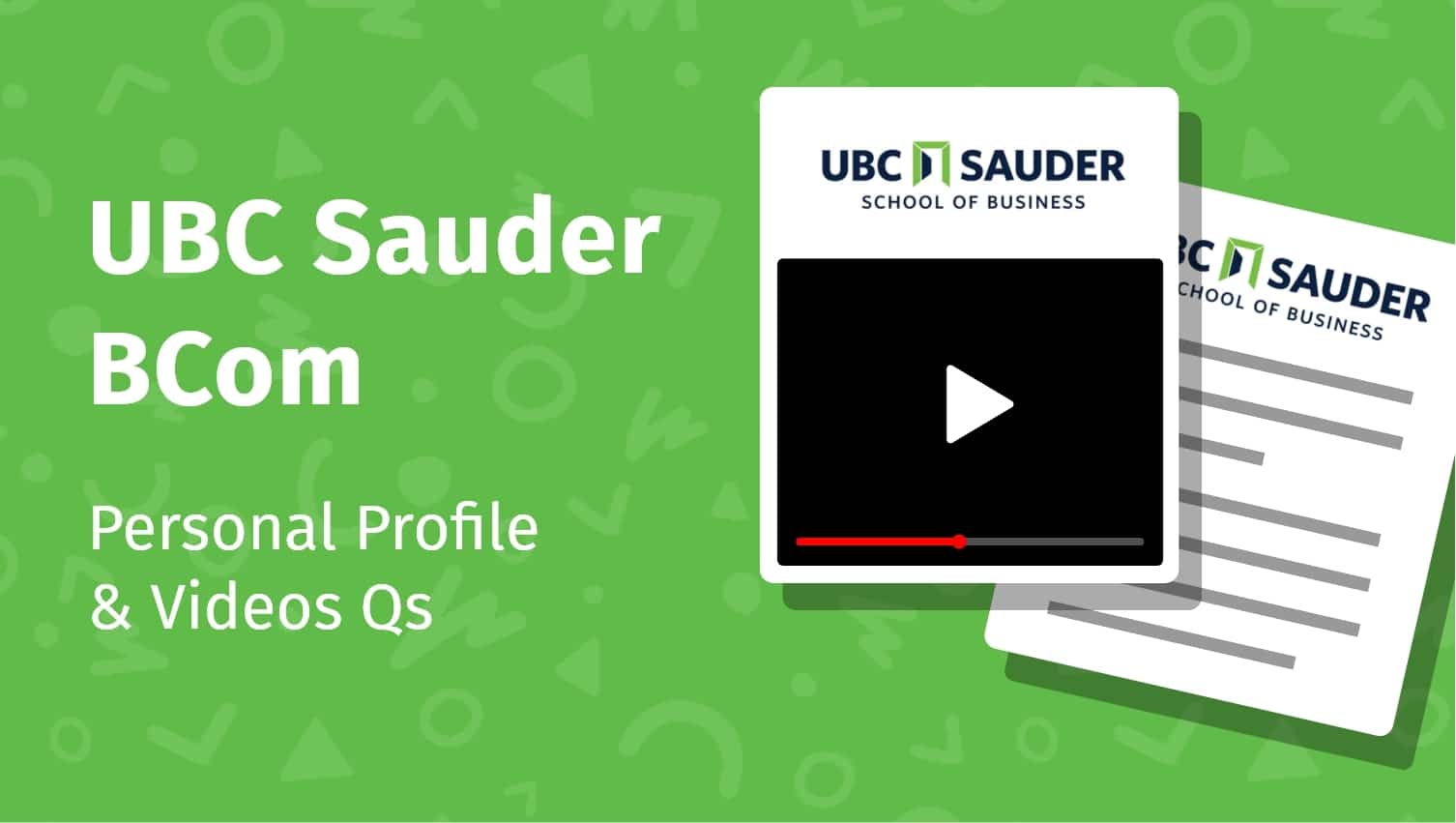
Application Prep
Ubc sauder application: personal profile examples & interview questions 2023-2024.
If you are looking for guidance on the UBC Sauder Commerce (BCom) application, including Personal Profile examples and video interview… Read more
3. SUBSTANCE:
The evaluators want to see that EVERY example, detail, and learning outcome you write about in your answers has a purpose and is meaningful .
They want to see that you’ve really thought about your answers and taken the time to prepare them.
Uniqueness is a HUGE factor here — you don’t want your answers to be basic and the same as everyone else’s. They need to dig beyond the surface and give relevant and interesting insights that other students might not have thought of.
The evaluators also want to see that you’ve built self-awareness and have asked yourself big questions like who you are , what you value , where you want to go , and how you’ll apply the lessons you’ve learned to get there .
If you have filled out our Student Identity Blueprint then this pulling out substance and deep personal insight in your essays will be a lot easier (if you haven’t filled out your Blueprint yet, click here to get started or connect with a coach ).
The evaluators want to see that you can communicate your ideas in an authentic and memorable way , using storytelling, emotional connection, and character development .
They want to see your personality and voice jump off the page — NOT the same generic essay over and over.
This might seem obvious, but a lot of students don’t know how to articulate their ideas in a genuine way that showcases who they are and explains what makes them different .
Once your Profile has been evaluated according to these criteria, it is compared with other students’ Personal Profiles . Then this score is applied to your overall admission average as well as other admission criteria (e.g. video interview), if applicable.
How to Use this UBC Personal Profile App Prep Guide
In this guide, we will provide breakdowns, templates, and examples for all 6 Personal Profile Questions.
IMPORTANT : The program you’re applying to might not ask you to answer all 6 questions (or some of the questions might be slightly different) or it might have some slight variations on the questions listed below. Make sure you read the ENTIRE application to make sure you aren’t missing anything for your program. For program-specific guidance, connect with a coach any time for support.
As mentioned above, all our templates use our Narrative Communication & Deductive Communication Approaches, so you can see what an effective structure looks like for the answers. We will use both approaches throughout this guide. Choose whichever approach you’re most comfortable with (or connect with a coach for support ).
We will use UBC Personal Profile templates and examples from the UBC Sauder BCom Personal Profile to show you what essays using the Narrative Approach look like. We have adapted these essays into the Deductive Approach structure so that you can see examples for this communication style as well.
Ace your UBC Personal Profile.
UBC Alumni & Youth Coach™
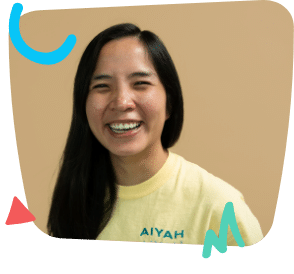
2022/2023 UBC Personal Profile Questions & Examples
Here are the UBC Personal Profile questions , as well as answer examples.
REMEMBER : The program(s) you’re applying to might include some or all of these questions (or some questions with slight variations). Make sure you read the entire application carefully to make sure you don’t miss anything! You can also connect with us for program-specific guidance .
UBC Personal Profile Answer Examples – Question 1
“Explain how you responded to a problem and/or an unfamiliar situation. What did you do, what was the outcome, and what did you learn from the experience? (Maximum 1,500 characters)”
UBC Personal Profile Question 1 – Breakdown
As the first question in your Personal Profile, this is where you have the opportunity to make a strong first impression .
This question prompts you to discuss a meaningful experience , where you were required to address a challenge or uncomfortable situation. The important thing here isn’t so much what the situation was, but how you handled adversity and what you learned from it .
Maybe you learned a new strategy for being a leader, or you saw the benefits of getting outside of your comfort zone, or you learned something about yourself.
Go beyond the surface and try to think of a problem/unfamiliar situation that will allow you to provide deep insight and self-awareness. Be as unique as possible, drawing out a learning outcome that is unexpected and memorable.
COACH’S TIP : Paint a vivid and detailed picture as much as possible, showing who you were before this problem and/or unfamiliar situation happened, and then what your initial reaction was, and how you resolved it. Let your personality shine through, while taking the reader on the journey with you.
Choose only experiences where you have a clear learning outcome that has changed who you are and how you view the world . You want to make sure that your answer has substance.
The reviewers want to see that you’ve really thought about why this learning outcome is important and how it can be applied to your life today (and in the future). If you can do this, we guarantee that your essay will stand out from other applicants. Not sure how to communicate your personal growth and learning in essay questions like these? Our Narrative Communication Guide and Deductive Communication Guides are a great place to start, and you can also connect with a coach to take your essay response to the next level.
UBC Personal Profile Question 1 – Template
Our template doc has BOTH the Narrative Approach (starting on p.1) and Deductive Approach (starting on p.9) templates listed below.
REMEMBER : There is a 1,500 character limit for this answer.
Here’s a template that follows our Narrative Communication Approach :
- Quickly capture the reader’s attention and set up the essay so they know what to expect.
- Set the scene with who you were before this problem/unfamiliar situation happened using the 5Ws (Why, What, When, Where, Why). If you can, focus on explaining who you were before this problem/situation occurred, like what you believed in, valued, etc.
- Describe the problem/unfamiliar situation and exactly what happened. Paint the picture vividly with your words and try to give enough detail so the reader feels like they are there with you. Briefly describe your emotions when this problem/situation occurred.
- Discuss how you responded to this problem and/or unfamiliar situation, how you solved it, and what the end result was (this is the ‘after’ scenario that you introduced in the Context section).
- Provide deep insight into some specific learning outcomes that occurred during this experience. Focus on 1-2 themes, while providing specific examples of the impact this experience had on your life today. Finally, write 1-2 sentences about how this experience will help you as a UBC student.
Here’s a template that follows our Deductive Communication Approach :
- State what the problem and/or unfamiliar situation was, and briefly how you responded to it initially.
- Explain why you had the initial reaction you did, and how you solved the problem and/or address the unfamiliar situation. Paint the picture vividly with your words, and give enough detail so the reader feels like they are there with you.
- Provide examples of what happened as you were working to resolve the issue, such as any roadblocks you faced, skills you used to make things easier, how you addressed them, and what the final outcome was.
- Provide deep insight into some specific learning outcomes that occurred during this experience. Focus on 1-2 themes, while providing specific examples of the impact this experience had on your life today. Finally, write 1-2 sentences about how this experience will help you as a UBC student.
UBC Personal Profile Question 1 – Example
Here are some examples of how to answer this question, using BOTH of our communication approaches.
REMEMBER : This is an EXAMPLE ONLY and is NOT meant for you to copy. Why? First and foremost, this is plagiarism and is a serious offense . Plagiarizing these essays will result in immediate disqualification from the admissions process . This can be easily detected using technology and application reviewers are usually trained and/or able to spot when an application isn’t original and does not align with an applicant’s background, personality, values, etc.
Example 1: From UBC Sauder Personal Profile Prep Guide, following the Narrative Communication Approach :

Example 2: Here’s an example of the same essay, but following the Deductive Communication Approach :
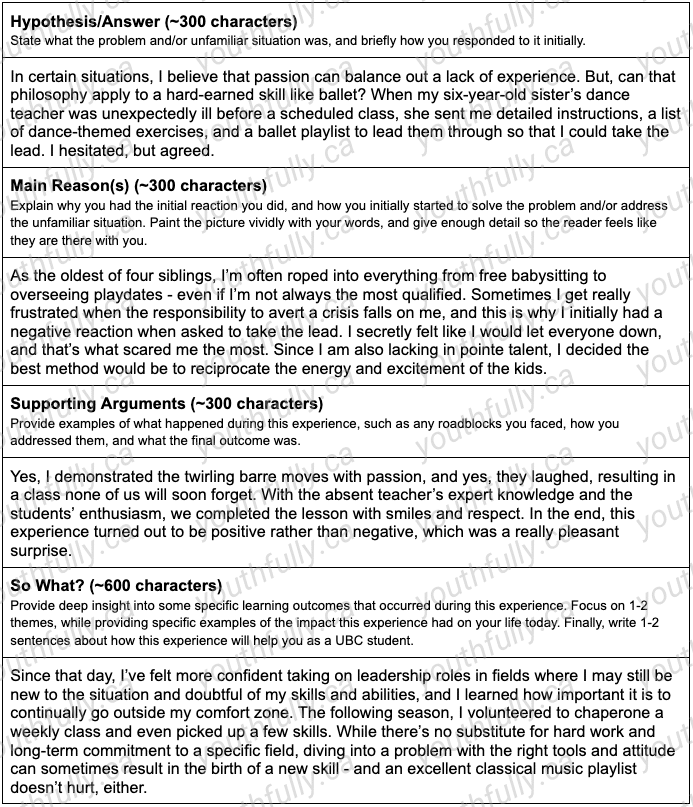
Program Guide
Ubc sauder school of business bcom: a definitive guide for applicants (2024).
This guide is for you if you’re thinking about applying to the Bachelor of Commerce (BCom) program at the UBC… Read more
UBC Personal Profile Answer Examples – Question 2
“Give us an example of how the pandemic has changed your involvement in the community or group most important to you. What have you learned from this experience? (Maximum 1500 characters)”
COACH’S TIP : Last year, the second question in the UBC Personal Profile was: “Give us an example of how the pandemic has changed your involvement in the community or group most important to you. What have you learned from this experience? (Maximum 1500 characters)”. If you come across this question and need some help with it, check out our breakdown, template, and example in our UBC Sauder App Prep Guide here .
UBC Personal Profile Question 2 – Breakdown
Our society is by no means uniform — and that’s what makes it so amazing.
Whether you’re walking around downtown Toronto or taking a day trip to your favourite neighborhood in Vancouver, you’ll see people from all different backgrounds, cultures, religions, sexual orientations, economic standings, etc.
This is exactly what a ‘diverse society’, as outlined in this question, means. A diverse society is a society that’s made up of all types of people with different ethnicities, races, genders, languages, religions, etc., as well as in thought processes, opinions and ideas, life experiences, values, and more.
Diversity also extends far beyond your community or city .
When you scroll through Instagram or Tik Tok, you’ll see posts and videos of people from all around the world showcasing their unique culture, experiences, and interests. In this way, social media has created a ‘global society’ that connects us all. More than ever before, we have access to other ways of life, and this can help us learn, grow, and contribute to this connected society.
A key part of diversity is also inclusion , or accepting everyone’s differences and making an effort to ensure that each person is valued and respected for who they are .
Now that you have a good understanding of what this question means by a global and diverse society, try to think about some ways that you’ve seen diversity (and inclusion) in action.
During your extracurricular involvement in your community, you’ve undoubtedly come across all types of people with difference backgrounds, perspectives, experiences, culture, ideas, language, sexual orientations, etc. And you’ve probably had the chance to share yours as well.
When writing this essay, we recommend choosing one extracurricular experience you had in your community within the last couple of years, when you worked or interacted with a diverse group of people. Maybe it was a fundraiser where you had to work as part of a team or an initiative you joined to help a part of your community that was in need.
You also want to choose one that was particularly meaningful — it should be one that initiated personal growth and changed your view of the world and the people living in it.
Maybe you realized that diverse perspectives actually make a team stronger because they open up various avenues of interpretation when dealing with setbacks and conflict. Or, perhaps you were part of a community project that initiated meaningful dialogue about an important issue or equipped you with the tools you needed to become a responsible global citizen.
Pick an experience where you challenged your views of yourself , and one that taught you something about the world you live in.
The key here is to think about how your community involvement has opened your eyes to new perspectives and will inform your views on diversity going forward. Focus on 1-2 key takeaways (or themes) that you can use as tools in the future to help you become a better person, global citizen, and leader.
Need some help figuring out which community involvement experience to choose? Connect with a coach for support.
UBC Personal Profile Question 2 – Template
REMEMBER : There is a 1,500 character limit for this answer. Here’s a template that follows our Narrative Communication Approach :
- Quickly capture the reader’s attention and set up the essay so the reader knows what to expect.
- Describe how you are active in your community, and how this involvement has allowed you to work with a diverse group of people. Use the 5Ws (who, what, when, where, why) to provide the reader with enough information that they get a good sense of this activity and your involvement.
- Talk about a situation, conflict, or experience where diversity played a significant role, and discuss exactly what that role was. Be as specific as possible and describe your emotions as much as possible here to create a memorable connection with the reader.
- Discuss how the situation you described in the Catalyst section turned out. Describe how you (and/or your team) used diversity to your advantage to generate a positive outcome. Use qualitative data (e.g. money raised, hours volunteered, people helped, etc.) as proof for the big impact your efforts had.
- Talk about 2-3 ways that your community involvement and the experience you discussed above have influenced you and changed your outlook on the world and your place in it. Describe how these learning outcomes have impacted you going forward and will help you navigate this complex world in the future and as a student at UBC Commerce.
- Briefly discuss ways that you (and/or your team) used diversity to your advantage to generate a positive outcome. Refer to specific qualitative data (i.e. exactly what you did, hours volunteered, money raised, etc.) to communicate the impact of your efforts.
- Give 2-3 examples of how taking part in this activity has prepared you for the future in this complex world, and how your view of diversity and a global society has changed as a result of you taking part in this activity.
- Talk about 1-2 ways that your community involvement and the experience you discussed above have influenced you and changed your outlook on the world and your place in it. Describe how these learning outcomes have impacted you going forward and will help you navigate this complex world in the future and as a student at UBC.
UBC Personal Profile Question 2 – Example
Here are some examples of how to answer this question, using both of our communication approaches.
REMEMBER : Please note that all of the examples in this guide are EXAMPLES ONLY and are NOT meant for you to copy.
Example 1: From UBC Sauder Ap p Prep Guide, following the Narrative Communication Approach :
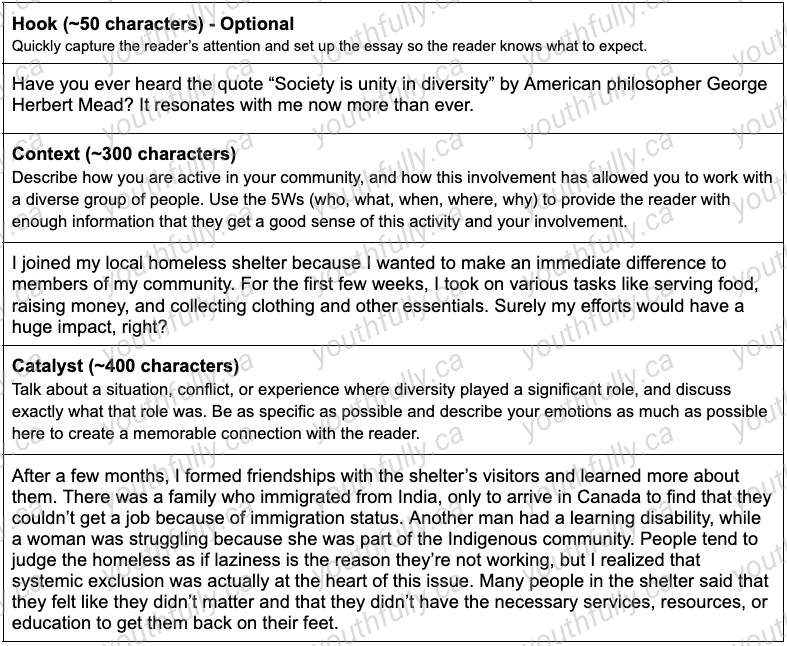
Need some help choosing an extracurricular experience to focus on in this essay? Connect with a coach for support.
UBC Personal Profile Answer Examples – Question 3
Tell us about who you are. How would your family, friends, and/or members of your community describe you? If possible, please include something about yourself that you are most proud of and why. (Maximum 1500 characters)
UBC Personal Profile Question 3 – Breakdown
This question is asking A LOT, in a REALLY limited space.
With so many topics to address, things can get pretty disjointed and chaotic if you aren’t careful.
To help you make an organized and articulate answer , we recommend tackling this question in the following way.
First, identify 1-2 themes that will unify the entire essay . This can be anything from a hobby or research interest, to a skill/value , extracurricular activity, or an audacious goal you’ve set/achieved.
Next, answer each of these 3 components , highlighting your theme(s) wherever possible:
- Introduce Yourself : Think of this component as your pitch to convince the evaluators why you’re a standout applicant who is the PERFECT fit for UBC. 🙂 Limit yourself to 1-2 memorable and unique facts that can be used to differentiate you from other applicants. You can talk about things like notable achievements and/or hobbies, unique experiences, things you value, skills you’ve worked on, etc.
- How People Describe You : Provide 1-2 adjectives that best describe you, providing direct quotes, feedback you’ve received, etc. wherever possible. This can be from friends, family, role models, a teacher, a coach — anyone whose opinion you value.
- Something You’re Proud of and Why : State a unique accomplishment that highlights the facts/adjectives you mentioned above in action, as well as the skills it took to get you there. Then, answer why you’re so proud of it and what you learned because of it.
Remember that your theme(s) is the focus of the entire essay , while the details in the 3 components listed above (e.g. facts about you, your experiences, personal anecdotes and insight, and lessons you’ve learned) give more details about how the themes relate to you and why they’re an inseparable part of who you are.
For example, say the overall theme of your essay is perseverance/determination, as well as your interest in entrepreneurship and software development.
You would start with the first component (i.e. introduce yourself) and talk about how you are a resourceful and independent person, who does whatever it takes to reach a goal once it has been set. You could say that this determination comes from your parents, who immigrated to Canada when you were 2 years old, and always taught you the value of working hard and going after what you want. After being inspired by their success as small business owners, you decided to pursue your interest in entrepreneurship.
Then, in the second component (i.e. how people describe you), you might say that your friends and family describe you as being very sure of yourself and confident in your abilities, which they saw when you started your own cyber security entrepreneurial venture. After seeing the struggles you went through, as well as all the late nights and trial and error, they realized how determined you were to go after your dreams.
Finally, for the third component (i.e. something you accomplished), you could say that the thing you’re most proud of is taking your small business from nothing to having over 20 clients and generating over $10,000 in sales in just a few months. You learned that a big part of perseverance/determination is learning to receive constructive criticism, while maintaining authority as a leader, and being open to evolve.
Here, you can see that the student provides a ton of details about himself (e.g. his family, immigrating to Canada, his interest in business, his organizational and leadership skills, etc.), while answering every component of the question. The theme of perseverance and entrepreneurship unifies and creates a focus for the entire essay, so that all the details are clear and organized.
We know that such a complex question might seem a bit intimidating at first, but if you break it down into smaller sections it’s much more manageable. We also recommend that you connect with a coach to help you choose unique and authentic themes, and help you articulate your interests, skills, experiences, and goals in a memorable way.
UBC Personal Profile Question 3 – Template
Here’s a template that follows our Narrative Communication Approach :
THEME(S):
- Capture the reader’s attention and give a quick preview of what’s to come.
- Briefly answer the question “Tell us who you are”, listing 1-2 notable facts that are an inseparable part of who you are (remember to use your theme as a focus). Provide 1-2 short sentences for each fact, giving enough detail that the reader can get a clear sense of who you are and your personality. You can start the essay with a statement like “I am…”, “I enjoy”, “I am passionate about”, “I value”, etc.
- Discuss how your friends and family would describe you, using 1-2 adjectives (which also relate back to your main theme). Use direct quotes or feedback you’ve received from people here as evidence.
- Describe an experience or two as evidence for why people would feel this way about you (e.g. volunteer work, social initiatives, extracurriculars, etc.), and make it an accomplishment you’re particularly proud of. Describe the outcome of the experience you noted above, using quantifiable facts (e.g. money raised, hours volunteered, people helped, etc.), as well as the skills it took to get you there. If you don’t have a specific experience in mind, mention another achievement or accomplishment or are particularly proud of, as long as it relates to the theme of your essay.
- Discuss what you have learned about yourself (and others) as you’ve explored your personal and academic interests and taken part in the activities you mentioned above. What have your experiences taught you about yourself? How have you evolved as a person? Finally, conclude your essay with a brief statement about how you will use the details you mentioned above to make you successful at UBC.
- Briefly answer the question “Tell us who you are”, listing 1-2 notable facts that are an inseparable part of who you are, while introducing the theme as the focus of your essay. Provide enough detail about your memorable facts that the reader gets a clear sense of who you are and your personality. You can start the essay with a statement like “I am…”, “I enjoy”, “I am passionate about”, “I value”, etc.
- Discuss how your friends and family would describe you, using 1-2 adjectives (which also relate back to your main theme). Describe an experience or two as evidence for why people would feel this way about you (e.g. volunteer work, social initiatives, extracurriculars, etc.). Use direct quotes or feedback you’ve received from people here as evidence.
- Describe the outcome of the experience you noted above, using quantifiable facts (e.g. money raised, hours volunteered, people helped, etc.), as well as the skills it took to get you there. If you don’t have a specific experience in mind, mention another achievement or accomplishment or are particularly proud of, as long as it relates to the theme of your essay.
UBC Personal Profile Question 3 – Example
Example 1: Here’s an example of this essay question, following the Narrative Communication Approach :
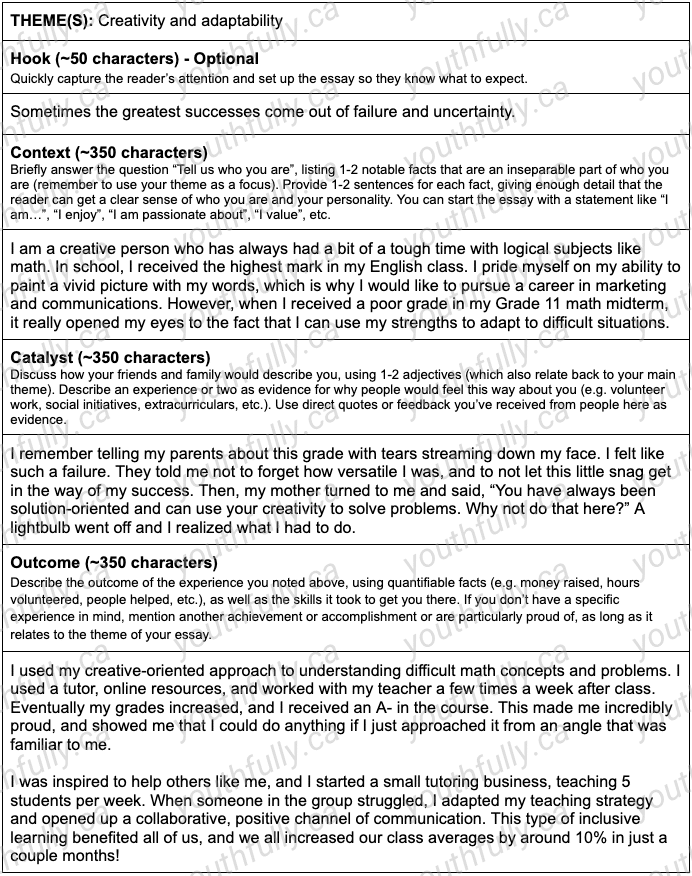
Need some help tackling tough UBC Personal Profile questions like this one? Remember — you aren’t alone!
Our Youth Coaches have helped hundreds of students create unique and authentic essay responses that showcase their skills, experiences, and strengths. Connect with a coach for all the support you need!
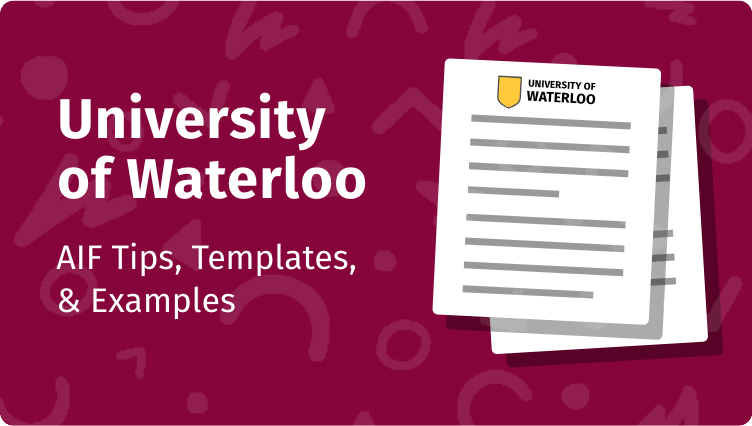
University of Waterloo: AIF Tips, Questions, & Examples 2023/2024
If you’re looking for Waterloo Applicant Information Form (AIF) questions, examples, and prep tips, then you’ve come to the right… Read more
UBC Personal Profile Answer Examples – Question 4
What is important to you? And why? (Maximum 1500 characters)
UBC Personal Profile Question 4 – Breakdown
Unlike Question 3, this question seems pretty straightforward. But don’t be fooled — it’s still asking a lot.
By finding out what is most important to you (and how it became important), the evaluators get a lot of insight into what makes you, you (and whether you’d be a good fit for UBC).
This question is left intentionally broad so you can discuss a wide range of topics like:
- Hobbies and interests
- Extracurriculars
- Competitions
- Community activities
- Social causes
- Role models
- Influential things/people in your life
- Transformational experiences
- Concepts and ideas (e.g. leadership, work/life balance)
When thinking about what you want to discuss, reflect on something that you’re genuinely excited and motivated about , and articulate this passion in your answer. The goal here is to make the evaluators as excited about it as you are.
Perhaps more important than the actual thing you discuss is WHY it’s so important (and how you communicate that).
Think about where you’d be if you hadn’t discovered it, and what life would look like without it.
Take the reader on a journey of how you have pursued this interest over time, the formative experiences you’ve had while doing so, and the positive things that have resulted from it.
Remember that an important part of the UBC Personal Profile evaluation rubric is focusing on learning outcomes, so you should always list around 2-3 life-changing things you’ve discovered about yourself along the way.
Finally, think about how this interest will ultimately make you a better student, and how you will continue to explore this interest at UBC. Do some research about specific clubs, programs, courses, etc. that will allow you to continually explore this interest and contribute to the UBC community as a whole.
Need some help deciding which topic to discuss for this essay question? We can help!
UBC Personal Profile Question 4 – Template
- State what is important to you. Answering the 4Ws (who, what, when, where) as much as possible so you provide enough information that the reader knows exactly what you are talking about. Discuss how it became so important to you (i.e. was there a specific event, time, or person where your interest started?).
- Describe what happened as a result of you pursuing it, such as skills you built, people you met, a career path you discovered, a goal you achieved, etc. Focus on 1-2 ways that it has impacted your life, and think about what your life would look like if you hadn’t discovered it. Briefly discuss any plans you have in the future to continue to pursue this area of interest.
- Talk about 1-2 learning outcomes that have occurred because of this interest. Answer questions like: How have I changed over time? How has it influenced my life? How has it changed my worldview and values? Conclude by briefly stating how this interest (and your learning outcomes) will help you succeed as a student at UBC.
- State what is important to you. Answering the 4Ws (who, what, when, where) as much as possible so you provide enough information that the reader knows exactly what you are talking about.
- Describe what happened as a result of you pursuing this interest, such as skills you built, people you met, a career path you discovered, a goal you achieved, etc. Focus on 1-2 ways that it has impacted your life, and think about what your life would look like if you hadn’t discovered it. Finally, draw on your experiences cultivating this interest and how your interest has grown or changed over time. Briefly discuss any plans you have in the future to continue to pursue this area of interest.
UBC Personal Profile Question 4 – Example
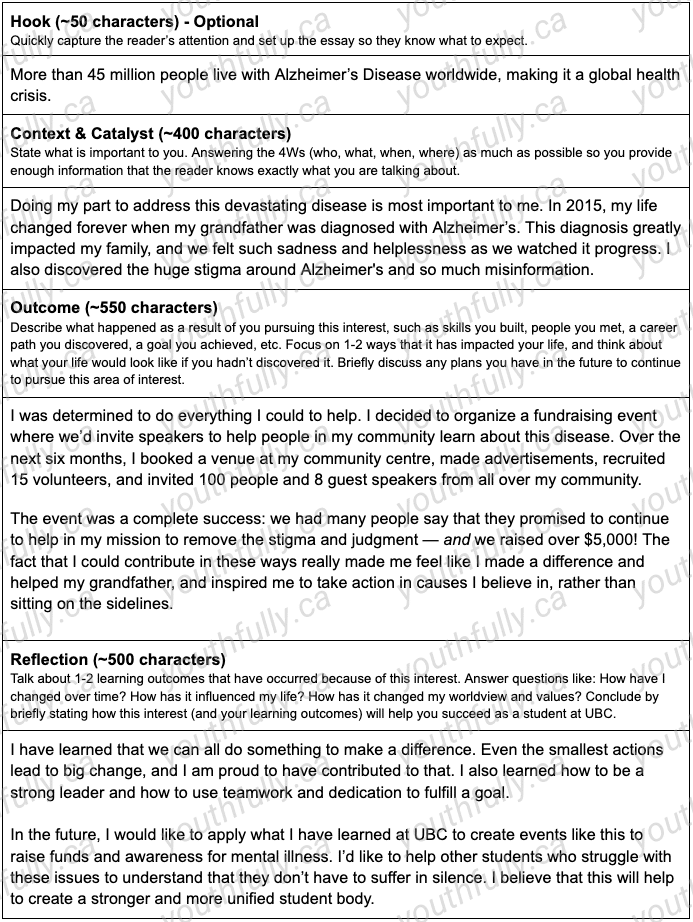
Example 2: Here’s an example of this essay question, following the Deductive Communication Approach :
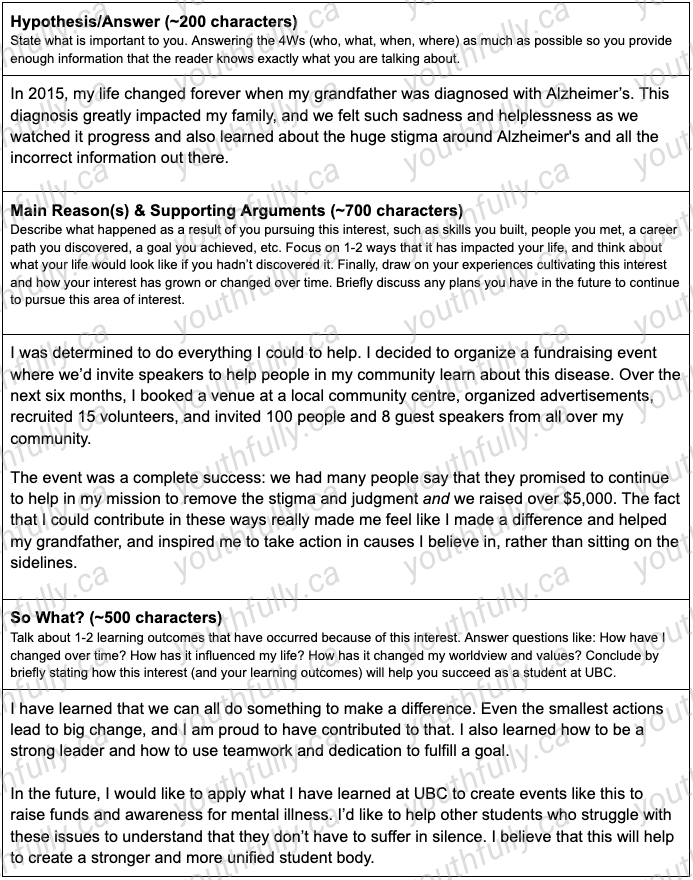
UBC Personal Profile Answer Examples – Question 5
List up to five activities or accomplishments in one or more of the following areas:
- Creative and performing arts
- Family and community
- Service to others
- Volunteering
- Work or employment
- Other
UBC Personal Profile Question 5 – Breakdown
UBC wants to see a broad range of activities in your Personal Profile, both inside and outside of school.
Choose extracurricular activities (like volunteer work or being a President of your school’s debate club), hobbies (like learning a new language), interests (like competitive swimming at your local community center), and/or general activities you enjoy doing with your family, friends, or members of your community (like playing tennis).
COACH’S TIP : As mentioned above, the evaluators DON’T want you to simply list a bunch of activities you have done. Instead, they want you to talk about activities and experiences that have created learning outcomes that have profoundly shaped who you are as a person, while communicating these lessons in a unique, authentic, and memorable way (this will be especially important for the next question, which we will discuss more below).
Choose up to 5 activities that will show the depth and breadth of your experiences. We call this the T Model (learn more about it here ).
Here, you have 1-2 big activities that you’ve put a lot of time and effort into (this is the depth, or the vertical part of the ‘T’). For example, this could be a non-profit you started in your community, a fundraising event you organized to help address homelessness in your community, or giving a TEDx talk on an issue you are passionate about. These are BIG accomplishments that you’re super proud of. These should be the first ones in your Personal Profile, so you can wow the committee from the beginning. 🙂
Next, you’ll have 2-3 activities that take less time and effort, but are still super important for helping shape who you are (this is the breadth, or the horizontal part of the ‘T’). For example, these could be an online course you took that ignited your interest in finance management or a summer internship you did that helped you develop your communication and leadership skills.
Structuring your activities in this way will show the evaluators that you have well-rounded experience in many areas.
We know that identifying (and participating in) activities like this can be difficult, especially if you don’t know where to start. But don’t worry, we’ve got your back. Our unique approach will help you and your coach identify and execute audacious and authentic goals (we call these AYA goals) that are perfectly aligned with your interests and passions , so you can accomplish what you want (and have amazing experiences to talk about on your application). Connect with a coach to get started and check out our Goal-Setting Guide now.
UBC Personal Profile Question 5 – Template
REMEMBER : There is a maximum of 300 characters per activity .
For this question, you will be asked for the following information:
- Activity Type : State what this activity is, using the list above. If your activity isn’t mentioned in that list, write a 1-2 word description.
- Start Date : State when you began this activity (month/day/year)
- End Date (optional): State when you completed this activity (month/day/year). If you are still doing it, leave this blank.
- Ongoing (optional): If this is an ongoing activity, check this box.
- Frequency: Select from the dropdown menu how often you participate in this activity (for example ‘Regular Weekly Activity (5-10 hours per week).
- Short Description (max 300 characters): Briefly describe your role in this activity and what it was for (e.g. President of your school’s economics club). Then, describe what you did, as well as what quantifiable outcomes (i.e. money earned, hours dedicated, etc.) and what you learned as a result of taking part in this activity (if you have space).
COACH’S TIP : On the EducationPlannerBC site, you will have to add each activity individually to your profile. Our template will ensure that you have all the correct information beforehand so you can have everything prepared and proofread.👍
UBC Sauder Personal Profile Question 5 – Example
Here’s an example of a list of activities for this question :
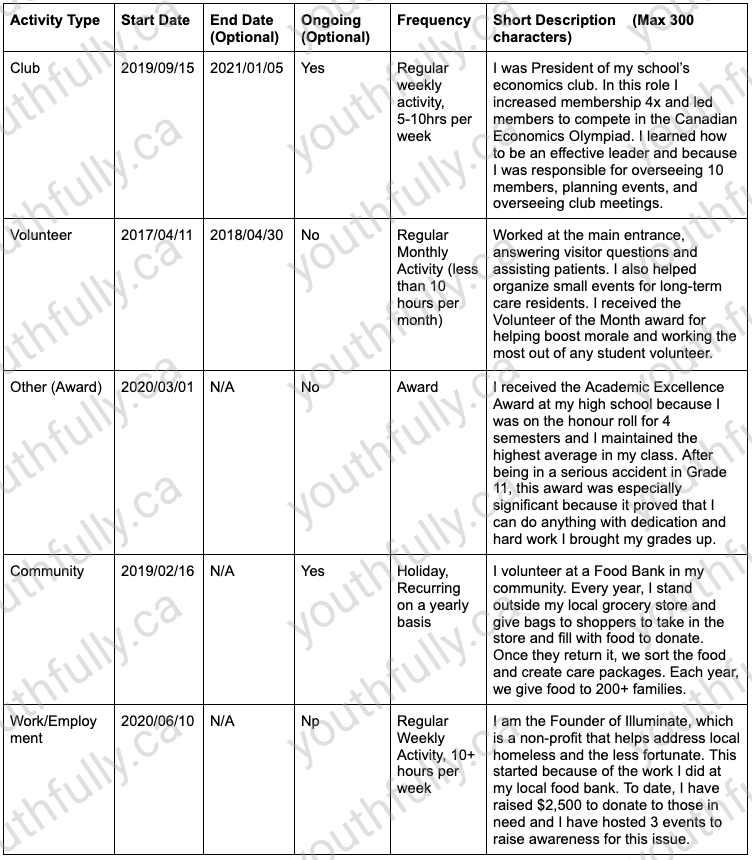
Find the mentor you’ve been looking for.
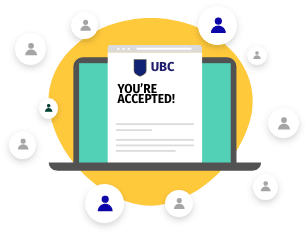
UBC Personal Profile Answer Examples – Question 6
Tell us more about ONE or TWO activities listed above that are most important to you. Please explain the role you played and what you learned in the process. You will be asked for a reference who can speak to your response. (Maximum 2100 characters)
UBC Personal Profile Question 6 – Breakdown
This question gives you the chance to discuss further insight into the impact your experiences have had on you and how the lessons they taught helped shape who you are .
We recommend choosing 1 activity to write your essay on so that you can provide enough detail and create a memorable and unique story.
However, if you have two activities that both helped you discover a similar learning outcome , then you can write about 2.
For example, if you volunteered to help organize a fundraising event for Alzeheimer’s research and awareness, you could talk about why you took on this role, and then the leadership skills, time management, team work, and problem solving skills you developed along the way. Talking about this one activity using the template below is perfectly fine. However, let’s say you with the help of your Youth Coach you took your goals to the next level and started your own non-profit to continue the journey to fund research for this disease. This would be a great opportunity to discuss two activities because it shows your dedication and your evolving leadership and interest in entrepreneurship and business.
It’s also important to choose an activity that you genuinely care about , so that you can convey your passion to the evaluators, along with what you learned. Your experiences make up what you value and what you care about. If you completed your Student Identity Blueprint™ , it will be really easy to choose activities that align to your Nurtured Values and communicate these values in your Personal Profile. If you haven’t filled out your Blueprint, connect with a coach to get started.
COACH’S TIP : Make sure you give your reference a heads up that UBC might contact them. Discuss the activity you were involved in, as well as your role, responsibilities, and what you learned as a result of that experience. You can even email some talking points for them to use if they’ve contacted. You don’t want your essay to give one learning outcome and then your reference to give another, so take the time to make sure the messaging is aligned.
Finally, when discussing what you learned in the process, make sure you really focus on the qualities that UBC looks for in its students , like leadership, community involvement, team work, and a passion for the field you’re applying to.
If you need help deciding which activity from Question 5 to choose, connect with a coach for support. They can help you write an authentic and memorable response that will help you stand out from other applicants and increase your chances of admission success.
UBC Personal Profile Examples Question 6 – Template
REMEMBER : There is a 2,100 character limit for this answer.
- State the activity that you are discussing from the list you gave in Question 5. Describe what you did in that activity (i.e. your role, responsibilities, etc.). Try to answer the 5Ws (who, what, when, where, and why).
- Describe who you were before you started this activity and how your interests, values, etc. evolved while you were doing it. This can be a specific event that occurred while you took part in this activity or change over time. State some quantifiable outcomes that occurred as a result of your participation in the activity (e.g. money raised, hours devoted, etc.).
- Describe how this experience allowed you to learn and grow as a leader and student (this is the ‘after’ picture that you started in the Catalyst section). Provide deep insight and a unique learning outcome. Focus on 1-2 themes, while providing specific examples of the impact this activity had on your life today. Finally, briefly state how you will use this learning at UBC.
- State 1-2 activities that you listed in Question 5. Describe what you did in that activity (i.e. your role, responsibilities, etc.). Try to answer the 5Ws (who, what, when, where, and why).
- Describe how this experience allowed you to learn and grow as a leader and student (this is the ‘after’ picture that you started in the Main Reasons section). Provide deep insight and a unique learning outcome. Focus on 1-2 themes, while providing specific examples of the impact this activity had on your life today. Finally, briefly state how you will use this learning at UBC.
UBC Sauder Personal Profile Question 6 – Example
Example 1: From UBC Sauder Personal Profile Prep Guide, following the Narrative Communication Approach . This example is from the list of activities in Question 5, from a student who was the President of their school’s economics club.
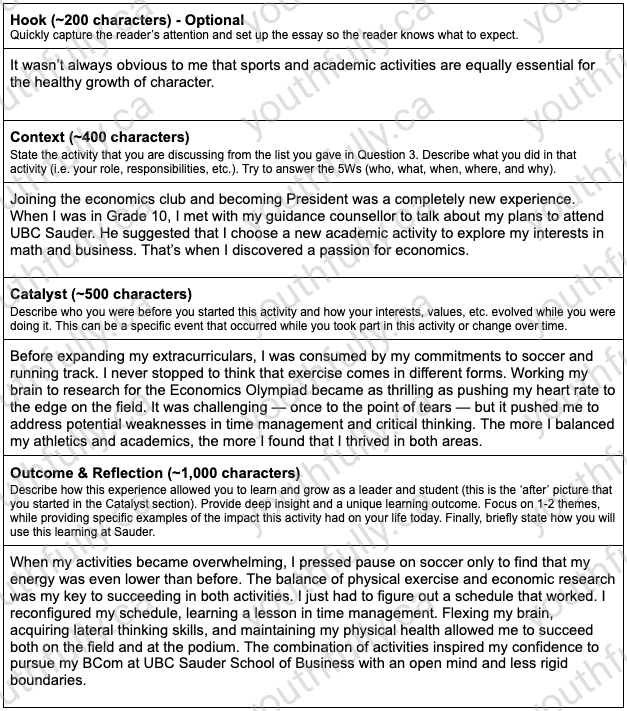
Need some help writing essays that describe your extracurriculars and what you learned? Connect with a coach for support.
UBC Personal Profile Answer Examples – Question 7
Additional Information (Optional): You may wish to use the space below to provide UBC with more information on your academic history to date and/or your future academic plans. For example: How did you choose your courses in secondary school? Are there life circumstances that have affected your academic decisions to date? What have you done to prepare yourself specifically for your intended area of study at UBC? (maximum 600 characters)
UBC Personal Profile Question 7 – Breakdown
So far in your Personal Profile, you’ve given the admissions committee some insight into your experiences and achievements inside and outside of the classroom with volunteer opportunities, extracurriculars, and various other activities.
All of these questions show how you undertake responsibilities , deal with setbacks when they arise, and have grown as a person along the way. Think of this as the development of your interests and passions through the activities you are involved in.
Question 7, on the other hand, focuses less on extracurriculars and other activities, and looks inside the classroom . Here, the reviewers want to know how your academic journey has developed your interest in business and led to you applying to UBC.
This question is very open-ended so that you can focus on basically any area that has impacted your academic choices and performance.
If you aren’t sure what to write here (if anything at all), have a look at your Student Identity Blueprint™ to help you identify why your interest in your chosen field began, your achievements thus far, and the skills/values that helped shape this interest (and who you are more generally). If you haven’t already completed your Blueprint, connect with a coach to get started on one.
The most important things to focus on for this question is how your courses in high school helped you develop your interest in your chosen field (and how you’ll continue to explore this at UBC).
You can discuss a gradual development over time or a specific event that changed academic choices/plans, and what you learned about yourself as a result.
Focus on courses that are applicable to the program you’re applying to as much as you can here.
Think about such questions as:
- What made you want to take this course?
- What challenges did you face when you did?
- How did this evolve your interest in your chosen field more generally?
- What skills, like leadership, communication, team work, and problem solving, did you develop along the way, and how?
- How will these skills and experiences you developed help you at UBC, and how?
COACH’S TIP : Use specific details and talk about the emotions you experienced as much as you can. This will help create a unique connection with the reader and transport them into exactly what you felt during the situation/experience you are talking about.
If you are unsure how to approach this question, connect with a coach to find an authentic angle that will emotionally connect with the reviewers while communicating your journey.
UBC Personal Profile Question 7 – Template
REMEMBER : There is a 600 character limit for this answer.
- Provide a brief description of your academic experience, including details like courses you’ve taken, skills you’ve built, and your experiences in high school. Briefly mention how these contribute to your interests and plans for the future (e.g. future studies, career, etc.).
- Describe any experiences, challenges, or setbacks (academic or personal) and discuss how these affected your academic decisions in high school and while applying to university. Emphasize the uniqueness of your experiences and the emotions you felt so that you can be as authentic as possible.
- Talk about what you learned as a result of this experience. How did it help you evolve as a person and student? Provide specific examples that show how what you’ve learned will help you excel at UBC.
- Provide a brief description of your academic history to date and/or your future academic plans.
- Provide some details and examples, like courses you’ve taken, skills you’ve developed, and your experiences in high school. Briefly mention how these contribute to your interests and plans for the future (e.g. future studies, career, etc.).
- Talk about what you learned as a result of your experiences, and how they’ve helped you evolve as a person and student. Provide specific examples that show how what you’ve learned will help you excel at UBC.
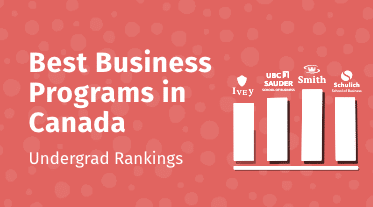
Rankings & Lists
Best business schools in canada 2024 (undergraduate programs).
You’re investing a TON of time, money, and energy towards your future. You’ve gotten the grades, done a bunch of… Read more
UBC Personal Profile Question 7 – Example
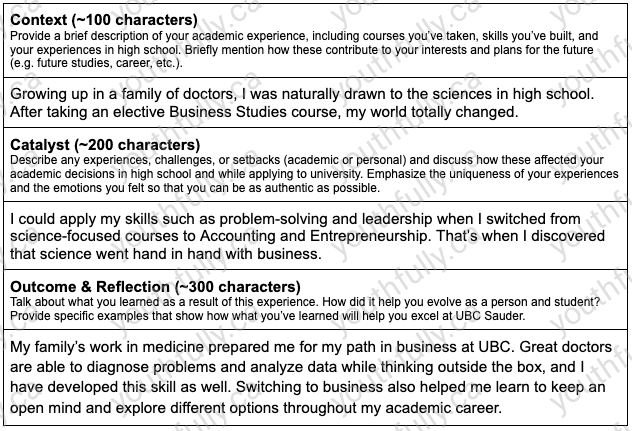
UBC Personal Profile Answer Examples – Question 8
Please submit the names of two referees who know you well and can comment on your preparedness for study at UBC. Examples of referees include an employer, a community member, a coach, a teacher/instructor, or anyone who knows you well. One of the referees you select MUST be able to speak to one of the activities / experiences described in one of your long-answer responses above. For applicants who are currently attending a high school, one of your referees MUST be a school official (e.g. grade 12 or senior year counsellor, teacher, or IB Coordinator). Neither referee should be a friend, family member, or paid agent.
The purpose of this question is so that UBC can verify the activities, experiences, and learning outcomes you discussed in the previous questions.
Before listing the names and contact information for your references, make sure that you ask your references for permission first , so that if they get a call or email from UBC then they’re not surprised.
UBC Personal Profile Question 8 – Template
You will need the following information:
- Relationship
- Email Address
- Phone Number
UBC Personal Profile Question 8 – Example
Here an example of the information for this section:
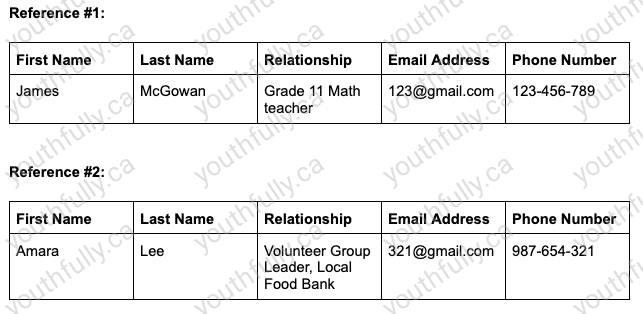
You’ve Got a Dedicated Coach in Your Corner
For over a decade, we have worked with thousands of students to help them achieve more than they ever thought possible.
Our coaches have a strong success rate supporting students as they apply to the University of British Columbia, among other top universities.
Our 1-on-1 Youth Coaching fills that gap that most high schools miss. We can help you build self-awareness through probing questions and assessments, set bigger goals to elevate your extracurriculars and future career plans, and improve skills that matter on supplementary applications, such as interviewing, written communication, critical thinking, and creativity.
We use a coaching methodology, called ‘full student’ development, that’s been proven to increase your chances of admission to top-tier universities and obtaining competitive jobs/internships.
So, what are you waiting for? Fulfill your post-secondary potential with the mentorship and coaching you’ve always wanted!
IMPORTANT : Want to share information and/or images from this resource on your own website, blog, article, etc.? Please ensure you reference content of any kind published by Youthfully Inc., in whole or in part, using the following statement: (1) Our Organization (Youthfully Inc.); (2) The title of our content/resource; and (3) the URL to our webpage where the content was originally posted. For example: “Sourced from: Youthfully Inc., “UBC Personal Profile: Examples, Question Samples, & Prep Tips 2023/2024”,’ https://youthfully.com/ubc-personal-profile-questions-examples-and-tips .” Not doing so is an infringement of copyright and is illegal. We spend significant time developing resources for students, so please take a few seconds to ensure they are referenced properly. Disclaimer : While the information in this blog is considered to be true and correct at the date of publication, and although our team makes every attempt to ensure that the information is accurate and vetted by university staff, Youthfully is not in any way liable for the accuracy of any information printed and stored or in any way interpreted and used by a user.
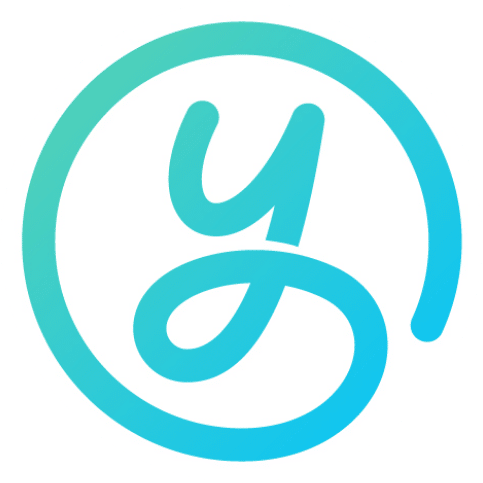
Youthfully is the world's most comprehensive admissions, career, and educational guidance platform. We empower students to unlock their full potential through a holistic, highly personalized coaching approach.
Personal Profile Overview
- What is the Profile?
- Why submit the Profile?
- Evaluation Rubric
- How to use this guide
Personal Profile Q1 & Q2
Personal Profile Q3 & Q4
Personal Profile Q5 & Q6
Personal Profile Q7 & Q8
Get 1-on-1 Support
- Connect With a Coach
Achieve Your Goals
1-on-1 youth coaching for students, youthfully inc..
5020 17 St SW Calgary, AB Canada T2T 6X2

All we need is your email.
We’ll send you free access to the entire course immediately.
We use cookies (yummy!) to optimize your Youthfully experience.
Tutor: UBC's Education Blog
Authored by and for UBC Undergrads
How to Write Your UBC College Application

Applying to college can be tedious. What differentiates a candidate that is accepted to one that is declined, is a great college application essay. The essay is the most complex component of the application process, and is what remains between you and admission to your dream colleges.
Here are some tips to write a great college application essay to stand out from the crowd:
1. Plan your application
Think about how you would string your points together in a cohesive flow. At this point you can further organize your thoughts into an outline format that can help to gather your thoughts and the argument of the essay as a whole to convince the university admission office to accept you. It is important not to get into too much detail – writing keywords and phrases are the best solution. Highlight your strengths.
2. Choose a topic that highlights your story
Share your personal story and thoughts in your personal statement . It is useful to take a creative approach and highlight areas that aren’t covered in other parts of the application, like your high school records. It may help to treat the college application like a job application, and writing your cover letter.
3. Create a compelling introduction
Condense what you’re trying to say into a short introduction. Your first few sentences should be an ‘Elevator Pitch’ style summary of your essay. should be interested in it. Your introduction for your essay should sell the idea of it to a reader, leaving them wanting to read the essay in question.
4. Be original
Top competitive colleges are looking for originality and quality . The application essay is an opportunity to impress an admissions officer with your determination and knowledge of your chosen subject. It should reflect your skills and ambitions , and highlight how your chosen program will help you achieve future goals. Don’t rely on phrases or ideas that people have used many times before. Statements like “I am passionate about helping people in poverty” are generic and should be avoided. If you are passionate about this, delve into why, or your own personal experience that brought you on this path. Whilst you want to maintain originality and showcase your own personal flair, avoid formal language as it can begin to sound monotonous.
5. Proofread your application and ensure that it flows well
Check the order of your paragraphs and ensure that your strongest points and ensure that your paragraph order makes sense. Reread your essay and check to see if it makes sense. Make sure that sentence flow is smooth and add phrases to help connect thoughts or ideas. On the other hand, remove sentences that do not add value to your application – you want to demonstrate the ability to hold-back. Finally, check your application for grammar and spelling mistakes.
Normal 0 false false false EN-NZ JA X-NONE
Although the college application process can seem challenging, good preparation will ensure you have the best chance at receiving an offer from your dream university. Good luck!
Spam prevention powered by Akismet
- Academic Calendar
- Campus Services
- Faculties & Schools
- Student Service Centre
- UBC Directory
How to Apply

We invite you to apply to UBC to be part of an incredible community of problem-solvers and innovators. Even as undergraduates, our students are making a difference in the world – through their involvement in student engineering design teams , contributions as co-op students and innovative capstone projects .
We'd love for you to join us. Here are the steps involved in applying to UBC to study engineering as an undergraduate student.

Step 1: Admission Requirements

Step 2: Application Process

Step 3: Submit Your Application

Step 4: Tuition and Scholarships
Step 1: find out if you meet our admission requirements.
If you want to study engineering at UBC, you will be applying to the Bachelor of Applied Science (Engineering) degree. The admission criteria vary and depend on factors that include:
- If you attended high school in Canada or internationally .
- Whether you want to study at UBC Vancouver or UBC Okanagan .
- If you self-identify as an Aboriginal person .
- If you are transferring from one of our Engineering Transfer Programs .
- If you are transferring from another UBC Faculty or post-secondary institution .
Check if you meet our admission requirements:
- Read What courses do you need to get into engineering ? to learn about some of the high school credits we’re looking for.
- Head to UBC Admissions for details on courses you need to have completed, general grade point averages, English language requirements and more.
What to do if you don’t meet our admissions requirements
If you don’t meet our admission requirements and you would still like to study engineering at UBC, you can pursue a few options. Depending on your circumstances, these could include:
- Applying to our Engineering Transfer Program and completing first year at one of nine partner universities and colleges.
- Upgrading your high school courses to get the credits you need in Physics, Chemistry, Math or English.
- Applying to Vantage One Bachelor of Applied Science if you don’t meet the English language competency requirement.

Next steps if you meet our admission requirements
If you think you meet our admission requirements, great! Check out the steps below to learn what’s involved in applying to UBC.
Step 2: Familiarize yourself with the application process
UBC has a centralized application process. That means that no matter what Faculty you are applying to, you will submit your application to UBC Admissions.
You can find all the information you need to know about applying to UBC on the UBC Undergraduate Programs and Admissions application instructions page.
Here are a few things to keep in mind about the application process:
- Applications will open in October of the fall before you wish to begin at UBC.
- You can start the application before the deadline . Simply save your application while it is in process and return to it later.
- You will be asked to submit transcripts and other documents after you submit your application, so you do not need to have final grades for your current courses.
As part of your application, you will be asked to:
- Answer a series of questions about yourself and list your top two choices for what degree you want to study and where you want to study (UBC Vancouver or UBC Okanagan). If you definitely want to pursue engineering, you should indicate Bachelor of Applied Science (Engineering) for both options and then either UBC Vancouver or UBC Okanagan as your first choice (with the other campus being your second choice).
- Submit a personal profile , which requires short essay responses.
- Share the names of two references .
- Pay a non-refundable application fee
- High school transcripts
- International Baccalaureate results
- Advanced Placement exam results
- Proof of English language competency
- Post-secondary transcripts
These details are explained step by step on the UBC Undergraduate Programs and Admissions application instructions.
Learn more about UBC Engineering
You likely have some questions about UBC Engineering. A great way to learn more is to sign up for our annual open houses or one of our many events . These events cover a wide range of topics, from learning more about what engineering is all about to insider admissions tips!
More about UBC Engineering
Learn more about our foundation year program , which sets you up to make an informed choice about which engineering specialization is best for you.
Explore the 14 programs on offer at UBC Vancouver and four programs at UBC Okanagan . You will apply to your specialization at the end of first year.
Chat with a student about their experience.
Follow our Engineering Stories Team on TikTok, Instagram or YouTube to see what life is like as an engineering student.
Step 3: Keep track of deadlines and submit your application
The online application portal for UBC for the Winter Session (September to April) opens in early October. Remember that you can start your application and save it while it is still in process. Just make sure you submit before the deadline !
Application Deadlines
The deadline to apply for September entry is January 15 . However, you need to apply earlier if you want to be considered for scholarships and awards or for first-round offers of admission.
Early October: Online application open
November 15: Award application deadline for international applicants who want to be considered for the UBC International Scholars Program awards .
December 1 application deadline for:
- International applicants up for a UBC International Scholars Program award
- Canadian citizens and permanent residents to be considered for the Presidential Scholars Awards and UBC Centennial Scholars Entrance Awards .
- High school students studying a Canadian curriculum who want to be considered for a first-round offer of admission .
- Canadian post-secondary applicants who want to be considered on the basis of interim transcripts.
January 15 : Application deadline.
You can find all the important dates on admissions deadlines at Dates and deadlines .
Document deadlines
After you’ve submitted your application, UBC Admissions will email you to let you know which documents you are required to submit and when. The documents required will vary depending on your level of studies, location and program.
- Review the Dates and deadlines page for the important dates to keep in mind.
- Select the category that best describes your education background to learn how to submit your documents .
Step 4: Learn about tuition and scholarships
Your tuition fees will depend on whether you are a canadian student or international applicant, as well as how many courses you are taking:.
- Find out more about tuition fees
- Estimate your total fees with the cost calculator
Want to learn about scholarship and funding opportunities? Learn more about:
- University-wide scholarships, bursaries and awards
- Engineering-specific scholarships
Remember that you will need to submit your application ahead of the December 1, deadline for admission to the upcoming school year if you want to be considered for certain scholarships.
As a student, you can also earn while you learn by:
- Participating in Applied Science Co-op , where you will benefit from paid, relevant work experiences with leading employers.
- Pursuing other work experience opportunities, including Work Learn and undergraduate research .
A UBC Engineering degree is an investment in your future. Unlike other professional degrees, you can start working in your field immediately after you finish your undergraduate education without having to complete additional post-secondary studies. Find out why engineering might be the most versatile undergraduate degree and how UBC Engineering sets you up for success .

Want to know more about UBC Engineering?
Sign up to receive emails from us, and every few weeks we’ll keep you up to date on topics to help you learn more.
Subscribe now
Latest Why Engineering Articles
Discover how UBC Engineering can set you up for success and a versatile, practical and rewarding career.
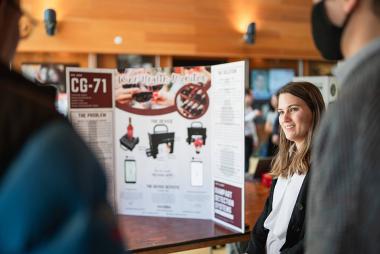
Engineering is one of the most rewarding careers
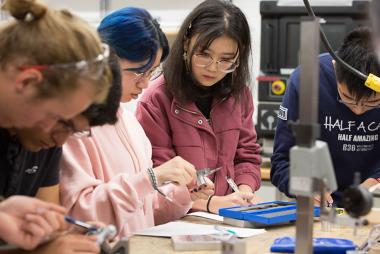
Discover student-centred learning at UBC Okanagan
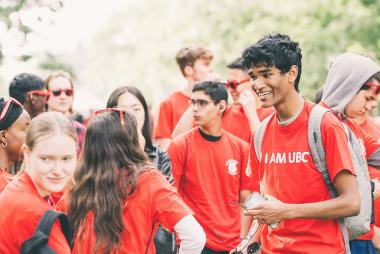
The skills you need to succeed as an engineer
Prospective student events, ubc engineering: everything you need to know, take your next steps.
- Discover our programs
- How to apply
- Chat with a student
- English Language
- English Literature
- English Language and Literature
First-Year English
- Teacher Education Preparation – Minor
- Opportunities
- Advising and FAQ
- Master’s Program
- PhD Program
- Publications
- Networks & Projects
- Land Acknowledgement
- Job Opportunities
First-year English is the gateway to brilliant courses in English literature and language, whether you are getting ready for an English major or meeting a degree requirement at the University of British Columbia.
The Department of English Language and Literatures offers an exciting variety of first-year English courses in literature and writing, including a unique course for students who think they might want to major in English.
Most UBC faculties require students to take 3 or 6 credits of first-year English. Check your Faculty requirements before registering to ensure that you are taking the right course(s) for your program.
For Students in the Faculty of Arts
You can choose between four 100-level English courses: ENGL 100, ENGL 110, ENGL 111, and ENGL 140.
ENGL 100 (Reading and Writing About Literature)
ENGL 100 (Reading and Writing About Literature) can be applied towards your Writing Requirement; please note that this course is reserved for students in the Faculty of Arts and is recommended for students interested in an English Major, Minor, or Honours degree. As each section of this course covers different topics and texts, we recommend that you consult the course listings.
ENGL 110 (Approaches to Literature) OR ENGL 111 (Approaches to Non-Fictional Prose)
Either ENGL 110 (Approaches to Literature) or ENGL 111 (Approaches to Non-Fictional Prose) may be applied towards your Literature or Communications Requirement. In ENGL 110, students will study selected examples of poetry, fiction, and drama; in ENGL 111, students will study a selection of prose texts. As each section of these courses covers different topics and texts, we recommend that you consult the course listings to find a section that aligns with your interests.
ENGL 140 (Challenging Language Myths)
ENGL 140 (Challenging Language Myths) is considered an elective that examines a broad range of commonly held beliefs about language and its relation to the brain and cognition, learning, society, change, and evolution. It is recommended (but not required) for students interested in our Language and Language and Literature streams.
For Students in Other Faculties
You can choose between two 100-level English courses to fulfill your literature or communications requirement: ENGL 110 or ENGL 111.
First-Year Requirements for English Degrees
Please review the program requirements for each of our undergraduate programs if you are considering taking a major, minor or honours degree in English language, English literature, or English language and literature.
Faculty of Arts English Courses Requirements
As an Arts student, you are required to fulfill the faculty-wide requirements for your degree, as well as the requirements for your specific program. Learn how you can take courses from the Department of English Language and Literatures to complete the Faculty of Arts requirements.
The English Exemption Examination
If you have been accepted to UBC and you have earned a previous degree at a North American university (where English is the language of instruction) but have not taken the equivalent of 6 credits of UBC's First-Year English coursework, you may be eligible to write the Exemption Examination. Proof of completion of a previous degree must be presented when the test is written.
The department does not charge a fee for this test, but out-of-province students must arrange for the required invigilation and pay for the courier costs if they plan to write at another institution (applicants to the Faculties of Education and Medicine should note that they are not permitted to write this test in lieu of completing required First-Year English courses).
Format of the test
The English Exemption Examination is a two-hour test that requires candidates to write two essays.
The first essay question (1 hour) requires the candidate to read a brief prose passage (approximately 500 words in length) and to write an essay that responds to one of several suggested topics. The topics do not require highly specialized knowledge, but the writer will be assessed according to his or her ability to form a clear thesis or argument, use evidence to support logical claims, create coherent links between paragraphs, and employ the conventional elements of style and grammar in accordance with university level standards of discourse.
The second essay question (1 hour) requires the writer to compose an analysis of a brief poem (usually fewer than 25 lines) that explains the relationship between form and meaning. This essay should not consist of a mere summary but should explain how the poem's formal elements (style, meter, rhyme schemes, figurative language, narrative structure, etc.) contribute to the shaping of its themes. If you are a candidate who has not studied poetry since high school, we recommend that you consult either Sylvan Barnett's A Guide to Writing About Literature or an introduction to poetry text from a major publishing house (Penguin, Norton, Broadview, etc.).
The examination is marked as either a pass or a fail, and the decision cannot be appealed. The First-Year English Coordinator will mark the exam. Results are usually announced within two weeks after the sitting of the test. Candidates who pass the first essay are granted an exemption from 3 credits of English Composition; candidates who pass the second essay are granted an exemption from 3 credits of English Literature. Those who fail one or both sections of the exam should enroll in the required First-Year English course(s).
Appointments for test sittings
BC students are expected to write the test in the English department at the UBC Vancouver campus. Our office is located at the north end of campus on the third floor of the Buchanan Tower. The test must be written during our regular office hours and will be invigilated by a member of the First-Year English staff. Due to the volume of work that occurs at the beginning of a new term and during final examination periods, the Exemption Examination is not offered during the months of April and August, or in the first two weeks of January, September and December.
Students should contact the First-Year English Assistant, [email protected] to arrange for a test sitting.
Candidates should fax or mail an official transcript confirming that a previous degree was granted. They should make arrangements to have the exam invigilated by a university professor or administrator at an alternate institution. Candidates will be expected to pay for courier costs for sending the examination back to UBC for marking.
Exchange Students
First-year (100-level) courses are not available for exchange students. Please see the Go Global website for more information.
Frequently Asked Questions
How do I register for first-year English courses?
Inform yourself about your Faculty's communication requirements and find out which courses are required or recommended for your degree program.
Check the sections and schedules for the first-year English courses being offered in the term(s) for which you are registering
Register for your first-year English course(s) on your registration date. If you would like to register for 6 credits of first-year English in the winter session, be sure to register for one course in term 1 and one course in term 2. You are only permitted to register for one first-year English course per term.
How many 100-level English courses can I take?
Students may only take 1 100-level English course per term, but can choose to take them in any order they wish. It is recommended that students take these courses during their first year at UBC, as the pattern of registration priority by year-level makes it more difficult for students to register in first-year courses after being promoted out of first year.
What should I do if the course I want to register for is full?
If you find that the course you want is full, you may want to consider:
- Switching the order of your courses to see if there might be space in the other term. Remember: you can take First-Year English courses in any order, as long as you only take one at a time.
- Whether a different First-Year English course or format might meet your needs. English 110 and 111 are both options as First-Year courses.
- Confirming with your Faculty’s website or advising office whether they require specific English courses, or if they allow any combination of English courses adding up to the correct number of credits.
- Confirming that you are registering in the correct course.
- Try registering in a waiting list: most students who register in a time-specific waiting list are eventually placed in a course. Our office monitors these waiting lists and will move students into courses as space becomes available (usually in the final week before term begins and during the first week of class).
Remember: students in the Faculty of Arts are required to take ENGL 100 or WRDS 150 to fulfill their Writing Requirement.
As an AP or IB student, how do I receive advanced standing for first-year English?
Students with an AP English mark of 4 OR 5, a Higher-Level IB English mark of 5, 6, or 7, or an Advanced-Level English literature mark of "B" or "A" from the British system are eligible for advanced credit in first-year English. Advanced credit for AP, IB and British-system Advanced-level courses is assigned by Enrollment Services.
If you receive AP or IB credit, you are eligible to skip over 100-level English courses and jump into our exciting 200-level offerings (though if you are in Arts, you may still have to take a Writing Requirement course in one term, so do double-check!). You’ll need a bit of technical help registering, email [email protected] for registration help!
For further inquiries, please contact the Admissions Office at 604-822-3014 or at [email protected] . AP, IB and British-system A-level credits are based upon final grades only; predicted grades cannot be considered.

Find your place with us.
Whether you are exploring undergraduate or graduate studies, searching for information on tuition and scholarships, or ready to start your future at UBC, we are here for you. Your decision is very important to us. We want you to be successful, so please explore the resources below to find your path and place at UBC.

Undergraduate Admissions
Undergraduate programs.
Search UBC’s undergraduate programs by programs, faculties, and degrees.
Undergraduate Programs >
Learn how to apply to UBC. Find out about UBC’s admission requirements, how UBC makes admissions decisions, and important dates and deadlines in the application process.
Undergraduate Admissions >
Tuition & Scholarships
At UBC, we recognize the significant contribution you and your family make toward your education. We’re here to support you through financial advising, scholarships, bursaries, and other assistance programs.
Tuition & Scholarships >
Ready to Apply?
Apply to UBC >

Graduate Admissions
Learn about the unique offerings from our two major campuses:
- Grad Studies in Vancouver
- Grad Studies in Okanagan
MA, MSc, PhD? DMA, LLM, LLMCL, LLMT, MAAAPS/JD, MAP, MARCH, MASA, MASc, MASLIS, MBA, MED, MEng, MF, MFA, MFRE, MFS, MHA, MHSc, MJ, MLA, MM, MMEd, MMUS, MN, MOT, MPH, MPH/MSN, MPT, MRSc, MSCP, MSN, MSW? -->
Find the UBC grad program that’s right for you:
- Vancouver Programs
- Okanagan Programs
- Faculty of Graduate and Postdoctoral Studies in Vancouver
- College of Graduate Studies at UBC Okanagan
Aboriginal Students
- Indigenous Portal (Vancouver)
- Aboriginal Access Studies (Okanagan)
Continuing and Distance Education
- Extended Learning
- Distance Learning — Centre for Teaching, Learning and Technology (CTLT)
- Professional Development & Community Engagement (PDCE)
ESL Students
- English Language Institute (Vancouver)
- English Foundation Program (Okanagan)
- UBC Vantage College
- Writing Consultations
- Writing Workshops
Writing Resources
- Writing Seminars
Academic Integrity
Annotated resources, guides to writing and research, interrobang: a writing podcast‽, speaking in the disciplines, stem writing, video guides.
- CWSC News and Updates
- Job Opportunities
Academic Integrity is a core element of how we as scholars and professionals do our work (and live our professional lives) at UBC and beyond. Investigate “Introduction to Academic Integrity” designed for undergraduate students.
Familiarize yourself with standard features of academic genres by reading our annotated research articles, article abstracts, and grant applications.
These evidence-based resources describe some of the typical practices that occur in high-stakes writing situations, with a focus on academic genres: abstracts, lay summaries, literature reviews, research article introductions, etc.
“Interrobang” is the CWSC’s in-house podcast, dedicated to engaging with writing across campus in all its diverse forms.
Explore UBC resources specific to the writing situations within the sciences.
Watch these videos to introduce yourself to the fundamentals of academic writing and research. Content includes perspectives from both senior academics at UBC and undergraduate and graduate students.
One of the best ways to learn about the conventions and practices of scholarly speaking is by watching other people do it.
- BA History Program
- Opportunities
- Undergraduate Advising
Writing Centre
- Master’s Program
- PhD Program
- Academic Community
- PhD Co-op (Optional)
- TA Opportunities
- TA Resource Page
- Research Clusters
- Published Books and Monographs
- Recently Published Articles
- Former Members
- Job Opportunities
The History Writing Centre is an online resource available to any undergraduate or graduate students enrolled in a history course at UBC who would like help with their writing.
Research and writing are the most important skills that students develop during their university careers. The Writing Centre offers guidelines and tips for all aspects of the writing process, as well as the formatting of citations.
Peer Tutoring for History Essays
The Department of History has peer writing tutors for those who need assistance or a second opinion on their history essay. Our peer tutors are happy to review your drafts and discuss ways to improve your paper.
Drop-in Office Hours
- Tuesday: 11:30 AM to 2:00 PM on Zoom
- Wednesday: 1:00 PM to 3:20 PM in-person in BuTo 1226
The service will not be available during the reading break.
Acceptable citation styles
MLA Style – Developed by the Modern Language Association, a non-profit membership organization that promotes the teaching and study of literature and language.
Chicago Style – Developed by the University of Chicago. This style is sometimes known as Turabian Style.
Both of these styles place bibliographic citations at the bottom of the page as footnotes, or at the end of a paper as endnotes. Both citation styles are equally acceptable, and each has a series of rules for the citation of different kinds of sources, such as books, journal articles, chapters in collected works, etc. Each style also has a particular format for your bibliography, which must be included at the very end of your paper for the reader’s information.
Whether you choose to use the MLA or Chicago citation style, you must use the selected is style consistently throughout your paper. Keeping your citation format consistent is a key feature of a well-presented and well-referenced argument.
Inappropriate citation styles include APA Style, developed by the American Psychological Association, and CBE Style, developed by The Council of Biology Editors. These styles are commonly used in the Social Sciences and the Sciences, respectively, and feature in-text citations instead of footnotes or endnotes. If you feel that using in-text citations might be appropriate for your paper, consult your instructor or TA.
Choosing a Topic
When choosing a topic, a few things should be considered:
- Is the topic manageable? Make sure the topic is narrow enough to formulate a useful, manageable argument.
- Is there adequate source material available? Consider that an obvious or especially popular topic may put a strain on available library resources, and that a particularly obscure topic may yield very few sources at all.
- Is the topic credible? The student should be careful to avoid sensationalist topics, and should focus upon topics that can be dealt with historically. Finding an angle of historical inquiry often involves asking how and why particular events or circumstances influenced individuals and their societies.
- What interests you? Choose a topic that sparks your interest. Review lecture notes, texts and other course materials that have engaged you. If you’re still having trouble, speak with your instructor.
Drawing Conclusions
Your paper should propose strong conclusions. These conclusions should reflect the argument you stated in the introduction, and should summarize the material you have presented for the final consideration of the reader.
Restating your case is a literary device that brings the reader back to your initial claims after having reviewed the material, in order to complete the argument. Essentially you are reminding the audience of your argument and asking them to consider its validity now that you have presented all of the evidence.
Avoid ending your paper by posing a question for the reader’s consideration. Keep your conclusions focused on the evidence as it supports your argument and summarize your position concisely. If there are further considerations related to your subject that have yet to be examined by scholars, mentioning them would be an effective way to wrap up.
Formulating a Thesis
A research essay cannot simply report on historical events or ideas, it must have a particular point. When formulating a thesis, consider the following: What is a thesis? A thesis is the central, core argument being made by the author. The thesis should provide the research paper with a point, or reason for presenting the evidence uncovered during the investigation of the topic. Are a thesis statement and an introduction the same thing? No, the introduction presents the topic to the audience, defines the subject, period, and event or ideas to be discussed. The thesis statement makes clear to the reader exactly what is being argued by the author. What is it about this topic that is problematic? Many topics are naturally problem-based, and are readily debatable. Determining on which side of the debate you stand can lead to the formulation of an argument. Focusing on your stance(s) and arguing for their preeminence as causal factors would constitute a thesis for your paper. Do I agree with the scholarship? Determining where you stand on the chosen topic can be a starting point when developing an argument. Some topics are widely documented, but their sources may disagree with one another or present contrasting hypotheses or explanations. Are you convinced by a certain approach to a particular topic? Are they based upon newly discovered evidence that you find persuasive? Are there specific themes within this topic that I can investigate? Many historical topics involve many different actors or agents. You may wish to examine such a topic by focusing upon a particular sub-theme such as the role of women or minorities, the state of political or gender relations, or the influence of science and technology. This can be further explored in light of causative or consequential effects – that is, how did the actors or agents affect events, or how did the events affect the actors? Can the evidence that I have uncovered support the claim I am making? It would be wise to consider the evidence you have found during your investigation and weigh it objectively before writing your essay. Devising an argument before fully considering the material could lead to an unexpected discovery: your argument is flawed or unsupportable. Read your sources critically, and take careful notes of what you have discovered. After you have made your initial determination and formulated an argument, these notes will then help you to form the body of your essay. The more notes you have, and the more carefully you have kept track of the key evidence you have uncovered, the more easily you will be able to construct and link together the main points of your paper.
There are a number of resources available both online and in the UBC libraries.
Do not subscribe to radically revisionist interpretations of historical events or to conspiracy theories that cannot be supported by the weight of accessible, credible evidence. Well researched and well-written histories will always provide the reader with explicit references to the sources used in the authors’ investigations.
Online sources such as government documents, statistics, bibliographic references, etc. can be valuable sources of information. However, the credibility of these sources can vary widely. When consulting sources online, consider the nature of the publications you encounter.
Consider the following when evaluating an online source:
- What are the credentials of the person or group hosting the site?
- What was the publication date of the site, and when was it last updated?
- Are they making bold or innovative claims without providing reference to their own source material or evidence?
- Is it possible that their arguments are unsubstantiated?
The university library web site provides access to a wide variety of online academic journals, known as electronic-journals or Ejournals, and many historical journals are among them. Authors of articles featured in such sources are typically professional historians, and their work is usually peer-reviewed, which means that it has been examined for credibility and accuracy by an editorial committee and a series of experts in that particular field. Another valuable online resource is the article database kept by major periodicals such as The New York Times newspaper, The Economist magazine, etc.
Primary sources are those that were produced or recorded in the era which you are researching. The university’s library has a wide variety of primary source material including copies of newspapers and magazines dating back to the 18th century. Be sure to note all of the publication information for proper citation.
Secondary sources are those written about the past from the point of view of a future date. Typically they are produced by authors who have examined a variety of primary sources dating to a previous era or eras while conducting an investigation into an historical topic. After sifting through a good deal of evidence such as autobiographies, speeches, government records, etc, the authors of secondary sources are then able to draw a series of broader conclusions about particular historical subjects.
It should be noted, however, that not all the authors of secondary works on historical subjects are professional historians. It is also important to distinguish between an author who is summarizing other people's views, and an author's who is expressing his or her own views.
Consider the following when conducting your research investigation:
- Start early as the university’s library sources are placed under considerable strain when end of term approaches. Examine the library’s catalogue online and if it’s not available, you can request that they be sent to UBC via Interlibrary Loan.
- Speak with your Instructor and/or TA, they will undoubtedly have some suggested reading suitable for your research.
- Examine the authors’ bibliographies for further sources. The disclosure and citation of sources is a fundamental part of the discipline of history at every level, and the bibliographies of many works will yield a wealth of titles for additional reading.
- Taking notes as you examine your sources is a vital component of the research process, and they will be of immense value as you stitch the major points of your argument together. When reading, note down any major findings, authors, or quotations that you find which are of value to your central thesis. In these cases, each individual part or chapter of a monograph or an edited volume may have its own argument, and may draw a series of specific conclusions.
- Academic Calendar
- Campus Services
- Faculties & Schools
- Student Service Centre
- UBC Directory
- Apply to UBC
- Canadian high school students
- International high school students
- International Baccalaureate students
- Advanced Placement students
- University or college transfer students
- Mature students
- Academic English development programs
- UBC Conditional Admission Program
- UBC-Langara Aboriginal Transfer Partnership
- Plan for UBC
- Choose what to study
- First-year credit
- Write your Personal Profile
- Complete the application
- Disability-related considerations
- What we look for
- Submit your documents
- First-year study options
- Accept your offer
- Apply for a study permit
- Plan your finances
- Find a place to live
- Take care of your health and wellness
- Explore your academic options
- Plan your degree
- Register for your courses
- Get ready for UBC life
- Dates and deadlines
- How UBC determines your tuition fees
- What will your first year cost?
- Beyond Tomorrow Scholars Program
- Indigenous student awards
- Loran Awards
- Presidential Scholars Awards
- Schulich Leader Scholarships
- UBC Centennial Scholars Entrance Awards
- International Scholars
- Loans for Canadian and US students
- Awards for students with disabilities
- Funding for former youth in care
- Funding for veterans
- Financial schedule
- Living in residence
- Living off campus
- Interdisciplinary and innovative programs
- Sports and recreation
- Work programs
- Leadership and volunteering
- Clubs and societies
- Orientations
- Students with disabilities
- Arts and culture
- Indigenous students
- Former youth in care
- UBC stories
- Admissions Blog
- Campus tours
- Information sessions
- Student experience events
- School visits
- Student meetings
- Self-guided virtual tours
- Create an account
- Get your Guide
- Ask UBC a question
Your UBC questions
As a prospective undergraduate student, you probably have a lot of questions about UBC – from admissions and the application process, to finances and scholarships, to events and campus life. We’re here to answer your undergraduate student questions about UBC.
For questions about graduate admissions and applying to UBC as a graduate student, visit the Graduate Students page.
- Your account
* Required fields
Description
Contact information
Email address
You are a(n)
Future student information
School name
Country the school is in
You can unsubscribe at any time.
You're done!
- Wellness & Personal Development
- Academic Integrity & Citations
- Research, Assignments & Group Work
- University Essential Skills
- Our Space & Equipment
- Events & Workshops
- Tutoring & Advice
By Learning Commons Web Team on August 30, 2022 |Tagged with:
Websites & Videos
Articles & websites.
UBC Library: Evaluating and Citing Resources (Webpage, UBC Library)
UBC Library: Academic Integrity and Plagiarism (Webpage, UBC Library)
Purdue Online Writing Lab: Creating an Essay Outline (Webpage, Purdue University)
University of Ottawa Writing Centre (Webpage, University of Ottawa)
Assignment Calculators (Webpage, UBC Library)
Do You Actually Need to Read Your Textbooks (YouTube, College Info Geek)
This informational video covers the importance of reading assignments, how to balance readings from multiple courses, and how to evaluate reading sources.
How to Read an Academic Paper (YouTube, UBC iSchool)
The UBC iSchool describes the difference in reading an academic paper compared to a textbook and the best strategy to absorb the most information from a paper in this video.
Related Resources Guides
Academic and Professional Writing Resources (Website, CWSC)
From writing guides to annotated abstracts, check out all the online writing resources that UBC Library has to offer on this website.
Chapman Learning Commons Resources
Related toolkits.
Taking Notes
Notes are another inescapable part of getting a university education. We might not be able to make them fun, but we can offer tips on how to make them useful.
Managing Your Time
Wasting a lot of time online? Pulling too many all-nighters? Getting better at managing your time is easier than you think!
Thinking Critically
You can’t get the most out of university without learning to think critically. It isn’t easy, but with our handy guide, we’ll have you thinking up a storm in no time!
Try reading your textbook out loud, reading standing up or reading after doing exercise.
Did you find any or all of these methods effective for improving your attention?
Drop your comments below to tell us what you think!
Read More | 2 Comments
2 responses to “Writing”
Great tips.
By answering these questions I gained a better understanding of the content of the video.
Leave a Reply Click here to cancel reply.

Follow Admissions on Social Media
- Columbia on Instagram
- Columbia Admissions on Twitter
- Facebook Group
- Columbia on YouTube
Columbia-Specific Application Questions
Columbia-specific questions, also known as the writing supplement, tell the Committee on Admissions more about your academic, extracurricular and intellectual interests. These questions provide insight to your intellectual curiosity, habits of mind, love of learning and sense of self. They also allow the Committee on Admissions to learn more about you in your current community and why you feel Columbia’s distinctive experiences in and out of the classroom would be a good fit for your undergraduate education. We review your responses to these questions as an essential part of our holistic and contextual review , in order to get a fuller sense of you as a unique individual beyond the standard parts of the application.
A Columbia admissions officer talks about the Columbia-specific application questions, also known as the writing supplement.
2023-2024 Columbia-Specific Questions
Instructions.
For the list question that follows, there is a 100 word maximum. Please refer to the below guidance when answering this question:
- Your response should be a list of items separated by commas or semicolons.
- Items do not have to be numbered or in any specific order.
- It is not necessary to italicize or underline titles of books or other publications.
- No author names, subtitles or explanatory remarks are needed.
For the four short answer questions, please respond in 150 words or fewer.
- List a selection of texts, resources and outlets that have contributed to your intellectual development outside of academic courses, including but not limited to books, journals, websites, podcasts, essays, plays, presentations, videos, museums and other content that you enjoy. ( 100 words or fewer)
- A hallmark of the Columbia experience is being able to learn and thrive in an equitable and inclusive community with a wide range of perspectives. Tell us about an aspect of your own perspective, viewpoint or lived experience that is important to you, and describe how it has shaped the way you would learn from and contribute to Columbia's diverse and collaborative community. (150 words or fewer)
- In college/university, students are often challenged in ways that they could not predict or anticipate. It is important to us, therefore, to understand an applicant's ability to navigate through adversity. Please describe a barrier or obstacle you have faced and discuss the personal qualities, skills or insights you have developed as a result. (150 words or fewer)
- Why are you interested in attending Columbia University? We encourage you to consider the aspect(s) that you find unique and compelling about Columbia. (150 words or fewer)
- What attracts you to your preferred areas of study at Columbia College or Columbia Engineering? (150 words or fewer)
Maps of the April 2024 Total Solar Eclipse
By Jonathan Corum
On April 8, the moon will slip between the Earth and the sun, casting a shadow across a swath of North America: a total solar eclipse.
By cosmic coincidence, the moon and the sun appear roughly the same size in the sky. When the moon blocks the glare of the sun, the sun’s outer atmosphere, or corona, will be briefly visible.
Below are several maps of the eclipse’s path as well as images of what you might experience during the event.
Where Can I See the Total Eclipse?
The eclipse will begin at sunrise over the Pacific Ocean, then cut through Mexico and cross the United States from Texas to Maine. Most of North America will see a partial eclipse, but viewers within the deepest shadow — a band sliding from Mazatlán, Mexico, to the Newfoundland coast near Gander, Canada — will experience a total solar eclipse.
Percentage of
the sun obscured
during the eclipse
Indianapolis
Little Rock
San Antonio
Viewers inside the path of the total eclipse may notice a drop in temperature , a lull or shift in the wind , the appearance of bright planets in the sky, and the quieting of birds and other wildlife.
Many cities lie inside the path of the total eclipse, as shown below, the width of which varies from 108 miles to 122 miles.
20% partial eclipse
NEWFOUNDLAND
SASKATCHEWAN
Fredericton
Minneapolis
San Francisco
90% partial eclipse
Los Angeles
Mexico City
EL SALVADOR
Explore our interactive cloud outlook for eclipse viewing times and average cloud data at your location.
What Will I See?

A composite image of the 2017 solar eclipse over Madras, Ore.
Aubrey Gemignani/NASA
If the sky is clear, viewers in the path of the total eclipse should see a “diamond ring” effect a few seconds before and after the total eclipse, as the edge of the sun slips in and out of view.

The “diamond ring” effect during the 2017 solar eclipse.
Rami Daud/NASA, Alcyon Technical Services
The sun’s outer atmosphere, or corona, is normally hidden by the sun’s glare. These tendrils and sheets of gas, heated to a million degrees Fahrenheit or more, are in constant motion and shaped by the sun’s swirling magnetic field.

The sun’s corona during the 2017 solar eclipse.
The sun is relatively active this year and is nearing the expected peak of its 11-year solar cycle . Researchers at Predictive Science are using data about the sun’s magnetic field to predict and model a dramatic corona for the April eclipse.

A prediction of how the sun’s corona might appear during the April 8 total eclipse.
Predictive Science
What Colors Should I Wear?
As the sky darkens, light-sensitive cells in human eyes become more sensitive to blue and green hues than to reds and oranges. This shift in color perception is known as the Purkinje effect , after a 19th-century Czech scientist, and is typically seen at twilight.

Watching the 2017 total eclipse at Southern Illinois University.
Andrea Morales for The New York Times
To take advantage of the Purkinje effect, wear green clothes or a contrasting combination of greens and reds. Blue-green colors (shorter wavelengths) will appear brighter, while red colors (longer wavelengths) will appear to recede into the darkness.
What If I Miss It?
The next two total solar eclipses in the United States won’t occur until 2044 and 2045 . But eclipse chasers might catch one in 2026 in Greenland, Iceland and Spain; 2027 along the coast of Northern Africa; 2028 in Australia and New Zealand; or 2030 across Southern Africa and Australia.

A Total Solar Eclipse Is Coming. Here’s What You Need to Know.
These are answers to common questions about the April 8 eclipse, and we’re offering you a place to pose more of them.
By Katrina Miller

What’s the Cloud Forecast for Eclipse Day? See if the Weather Is on Your Side.
April 8 could be your best opportunity to see a total solar eclipse for decades. But if clouds fill the sky, you may miss the spectacle.
By Josh Katz, K.K. Rebecca Lai and William B. Davis
- Share full article
Advertisement

IMAGES
VIDEO
COMMENTS
The University of British Columbia. UBC - A Place of Mind. The University of British Columbia. UBC Search. Undergraduate Programs and Admissions. Apply to UBC; Programs; ... Each of the personal profile questions requires short essay responses (50 - 500 words), so you'll want to think about your answers before you start your online ...
Our coaches have a strong success rate supporting students as they apply to the University of British Columbia, among other top universities. Our 1-on-1 Youth Coaching fills that gap that most high schools miss. We can help you build self-awareness through probing questions and assessments, set bigger goals to elevate your extracurriculars and ...
Don't focus on what you think UBC wants to hear. Be authentic and use your unique voice to tell them what you want to say. Utilize the full word count (or as close as possible without going over) to create an effective essay and have the best impact on the UBC committee. Writing your Personal Profile:
Your introduction for your essay should sell the idea of it to a reader, leaving them wanting to read the essay in question. 4. Be original. Top competitive colleges are looking for originality and quality. The application essay is an opportunity to impress an admissions officer with your determination and knowledge of your chosen subject.
Step 1: Find out if you meet our admission requirements. If you want to study engineering at UBC, you will be applying to the Bachelor of Applied Science (Engineering) degree. The admission criteria vary and depend on factors that include: If you attended high school in Canada or internationally. Whether you want to study at UBC Vancouver or ...
The University of British Columbia. UBC - A Place of Mind. The University of British Columbia vancouver campus. UBC Search. Student Services. Student Services. New to UBC. ... 15 topics, and you know that there's going to be 5 essay questions on the test, and you only need to write 3 essays in total, you can do a bit of math to figure out how ...
First-year English is the gateway to courses across English literature & language, for all students at the University of British Columbia. Learn more. ... The English Exemption Examination is a two-hour test that requires candidates to write two essays. The first essay question (1 hour) requires the candidate to read a brief prose passage ...
Body Paragraph 1—Literary Device 1. III. Body Paragraph 2—Literary Device 2. IV. Body Paragraph 3—Literary Device 3. V. Conclusion. 3. Write a tentative thesis statement and topic sentences. You can't write a clear paper without first preparing the main argument or, in other words, a thesis statement.
Tips on answering the essay questions for the University of British Columbia MasterCard (master's) ScholarshipLink: https://mcfscholars.ubc.ca/apply/graduate/
Find your place with us. Whether you are exploring undergraduate or graduate studies, searching for information on tuition and scholarships, or ready to start your future at UBC, we are here for you. Your decision is very important to us. We want you to be successful, so please explore the resources below to find your path and place at UBC.
Guides to Writing and Research. These evidence-based resources describe some of the typical practices that occur in high-stakes writing situations, with a focus on academic genres: abstracts, lay summaries, literature reviews, research article introductions, etc.
Writing Centre. The History Writing Centre is an online resource available to any undergraduate or graduate students enrolled in a history course at UBC who would like help with their writing. Research and writing are the most important skills that students develop during their university careers. The Writing Centre offers guidelines and tips ...
Ask UBC. As a prospective undergraduate student, you probably have a lot of questions about UBC - from admissions and the application process, to finances and scholarships, to events and campus life. We're here to answer your undergraduate student questions about UBC. For questions about graduate admissions and applying to UBC as a graduate ...
The University of British Columbia Vancouver campus. UBC Search. Chapman Learning Commons. ... Creating an Essay Outline (Webpage, Purdue University) University of Ottawa Writing Centre (Webpage, University of Ottawa) ... By answering these questions I gained a better understanding of the content of the video.
If you're looking to attend university in Canada, you've likely come across the University of British Columbia! Ranked among the top 40 universities globally and one of the top 3 in Canada, UBC is a dream school for many. Here at GrantMe, we've helped many students apply to and get into UBC (check out Paige, Ripdaman, and Amisha's ...
Applying to UBC. As one of the world's top 40 universities, UBC has competitive admission requirements and attracts elite students from around the globe. Your journey to UBC begins with your online application, and we're here to provide you with the information, deadlines, and tips to help you put your best foot forward.
6. Provide details of your education history. You will need to share all of the different schools you have attended up until this point in time. You need to state the start and end dates of your education. Provide the full name and address of each school you have attended.
2023-2024 Columbia-Specific Questions Instructions. For the list question that follows, there is a 100 word maximum. Please refer to the below guidance when answering this question: Your response should be a list of items separated by commas or semicolons. Items do not have to be numbered or in any specific order.
UBC may assess post-secondary applicants on a combination of factors, including your grade point average (GPA), any required prerequisite courses, and a review of your overall academic history. We may also require you to submit a personal profile, supplemental application, portfolio, or audition. All you need to know about UBC's undergraduate ...
BRITISH. COLUMBIA. ALBERTA. SASKATCHEWAN. MANITOBA. ONTARIO. 30%. ... Watching the 2017 total eclipse at Southern Illinois University. ... These are answers to common questions about the April 8 ...
English language competency. English is the primary language of instruction at UBC. Before you're admitted, you must demonstrate a minimum level of English. There are nine different ways to meet this requirement, and academic English development programs for those who have not yet met the requirement. See English language admission requirements.